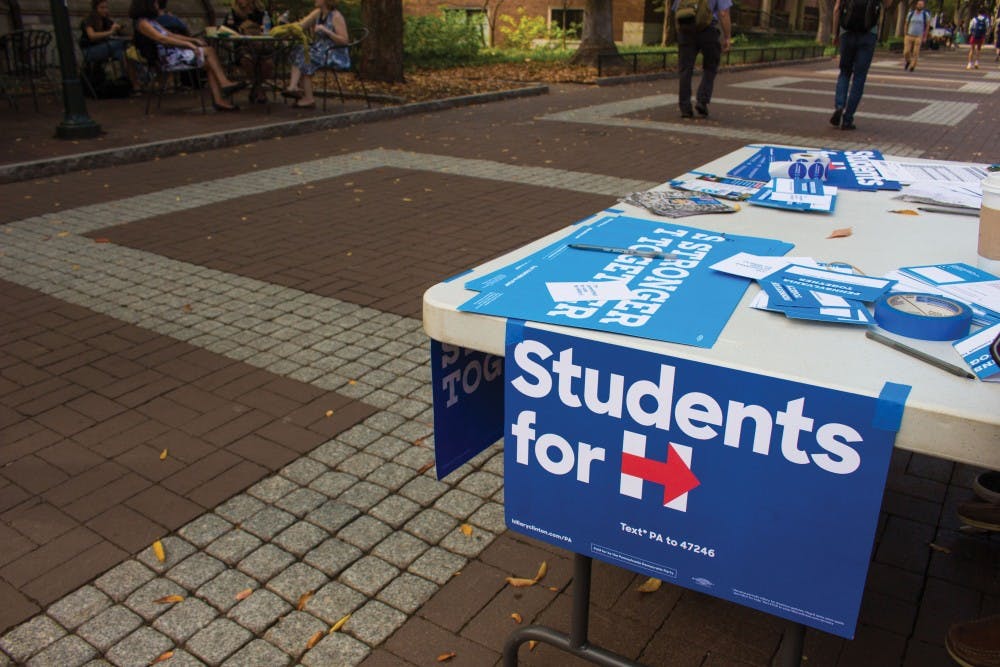
Rachel Pomerantz discusses opposing the Trump administration going forward.
Credit: Julio SosaNow that the presidential election is over, Penn Democrats must shift its focus. It seems fitting then, that the club elected a new president: College sophomore and mathematical economics major Rachel Pomerantz.
Penn Democrats provides political activism opportunities for Penn’s Democratic community. Pomerantz sat down with The Daily Pennsylvanian to speak about Penn Dems’ agenda for the spring semester.
Daily Pennsylvanian: How do you interpret the significance of Penn Dems to the fabric of the University?
Rachel Pomerantz: Penn Dems should be the first place on campus for anyone who calls themselves a Democrat and, along with that, who wants to do something to oppose the incoming presidential administration.
DP: Since Penn Dems will not be supporting the incoming Republican president, will you have to lead a realignment process within the club?
RP: Our mission was going to change from this semester to the next regardless of who won because we’re shifting from electoral politics to issue advocacy. I think that we’re going to continue to be strong advocates for the progressive issues that we care about. It’ll be different, but we’re up for the challenge — Dems has done phone banking, canvassing and voter registration as often as we possibly could over the past two semesters for the 2016 election. We’re going to stay involved with the down-ballot races coming up, but issue advocacy is going to take a more prominent role.
DP: In what ways are Penn Dems going to fight for different issues? What are your priorities?
RP: I think it’s going to take a variety of forms, whether it’s protests, canvassing or just publicity about these issues. As far as the issues that we care about, our members care about a diverse range of issues, particularly women’s rights, LGBTQ rights, climate change and gun violence.
DP: What are you plans for Penn Dems to advocate for and stimulate change in society with regard to those issues?
RP: I think that there are multiple levels involved. First of all, it’s creating awareness about the issue and the deeper factors at play. We talk about these broad issues on campus, raising publicity from that respect. It also is calling our legislators in Harrisburg and Washington, as well as applying pressure to city officials here in Philadelphia depending on the issue. It’s a mix of protest, publicity, phone banking and more direct action.
DP: Has this process begun yet or is it still in the works?
RP: We’ve done protests in the past but those were more linked to elections. We’re still in the stages of formulating what we’re going to do next year.
DP: Speaking of changes, President Amy Gutmann just deemed Penn a “sanctuary campus.” Do any of your future plans for Penn Dems involve fostering this concept?
RP: We were really excited by President Gutmann’s letter; I think it’s a very important symbolic step. We’re going to keep applying pressure to make sure the administration follows up that symbolic step with concrete measures to protect some of the most vulnerable students at Penn.
DP: What does Penn Dems hope to see from the administration to help undocumented immigrants?
RP: I think that pressuring the administration to have the staff resources to support undocumented students and to follow through on their commitments will fulfill what they mean by “sanctuary campus.” Also, the administration should provide more clarity to what they mean by “sanctuary campus.” It has a legal meaning for cities — there’s such thing as a “sanctuary city” —but as far as “sanctuary campus,” they need to define that. It’s a relatively new concept.
DP: Finally, on a personal note, why did you want to be the president of Penn Dems? What does this position mean to you?
RP: I’ve been involved with Penn Dems for the past year and a half. I was first a Senior Deputy member — which means you work under an executive board member — and then I was the Political Director for the past year. It has just been the most amazing community of people and I’ve had the most unbelievable opportunities over the past year. We took a fall break trip to DC my freshman year and we got to go to the White House. Also, getting to hear from amazing panelists has really broadened my horizons and understanding of political issues. I just couldn’t imagine not wanting to give back more to this great community.
This interview has been edited lightly for clarity and condensed.
The Daily Pennsylvanian is an independent, student-run newspaper. Please consider making a donation to support the coverage that shapes the University. Your generosity ensures a future of strong journalism at Penn.
Donate




